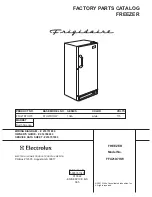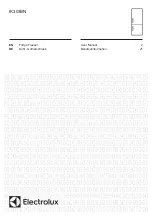
GB
Instruction for use
Do’s and don’ts
Do- Check contents of the freezer at regular
intervals.
Do- Clean and defrost your appliance
regularly (See "Defrosting")
Do- Keep food for as short a time as possible
and adhere to "Best Before" and "Use
By" dates.
Do- Store commercially frozen food in
accordance with the instructions given on
the packets.
Do- Always choose high quality fresh food
and be sure it is thoroughly clean before
you freeze it.
Do- Prepare fresh food for freezing in small
portions to ensure rapid freezing.
Do- Wrap frozen food immediately after
purchasing and put it in to the freezer as
soon as possible.
Do- Separate food in the compartments and
complete the contents card. This will
enable you to find food quickly and avoid
excessive door opening, which will save
electricity.
Don’t- Leave the door open for long periods,
as this will make the appliance more
costly to run and cause excessive ice
formation.
Don’t- Use sharp edged objects such as
knives or forks to remove the ice.
Don’t- Put hot food into the appliance. Let it
cool down first.
Don’t- Put liquid-filled bottles or sealed cans
containing carbonated liquids into the
freezer, as they may burst.
Don’t- Store poisonous or any dangerous
substances in your appliance. It has
been designed for the storage of
edible foodstuffs only.
Don’t- Exceed the maximum freezing loads
when freezing fresh food.
Don’t- Consume ice-cream and water ices
direct from the freezer. The low
temperature may cause 'freezer
burns' on lips.
Don’t- Freeze fizzy drinks.
Don’t- Try to keep frozen food which has
thawed; it should be eaten within 24
hours or cooked and refrozen.
Don’t- Remove items from the freezer with
wet hands.
Don’t- Close the door before replacing the
fast-freeze compartment cover.
6
Summary of Contents for FSA21320
Page 4: ...1 ...
Page 5: ...2 3 4 5 6 7 8 ...
Page 6: ...9 ...
Page 55: ...4574590100 24 02 2010 ...













































